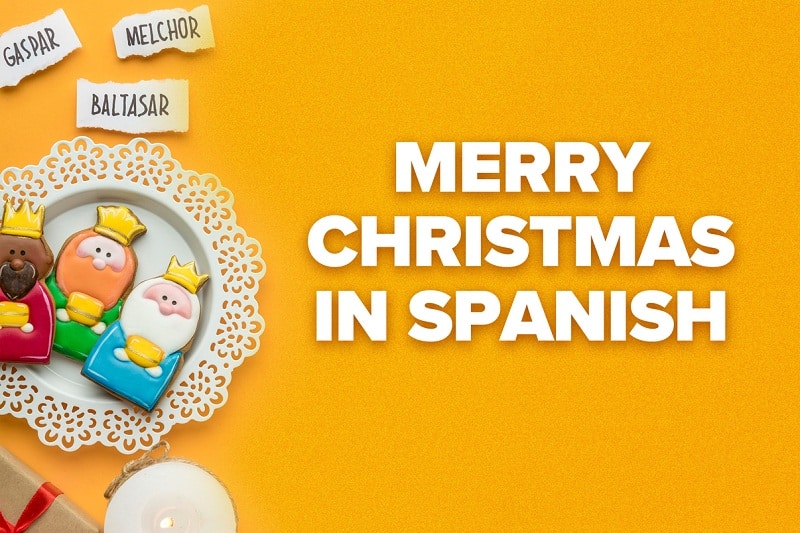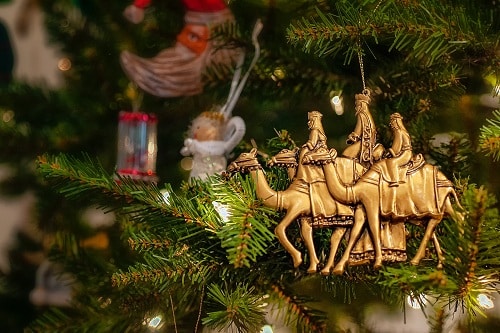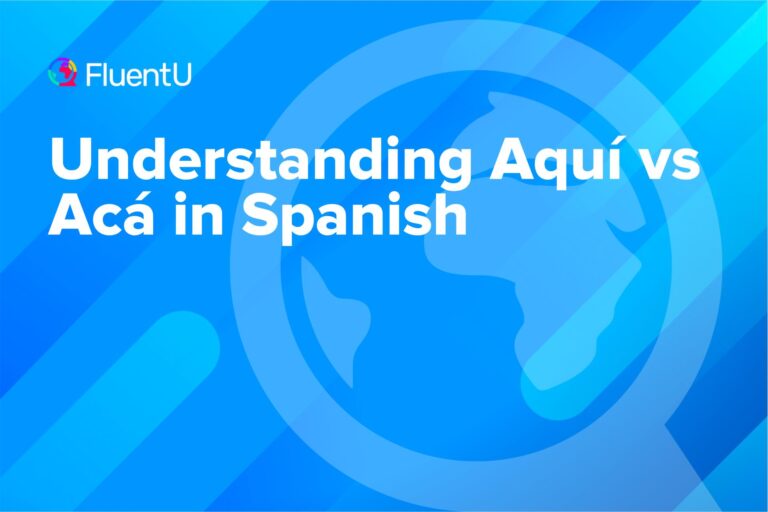“Merry Christmas” in Spanish and Other Holiday Greetings

You may already know the most common way to say “Merry Christmas!” in Spanish: ¡Feliz Navidad! But there are many other greetings and phrases you can use to spread festive cheer this holiday season.
Plus, you’ll want to have some Christmas-themed vocabulary in Spanish under your belt.
Download: This blog post is available as a convenient and portable PDF that you can take anywhere. Click here to get a copy. (Download)
Traditional Holiday Greetings in Spanish
Keep in mind that Spanish-speaking countries usually celebrate Christmas on December 24, not the 25th. They call this night Nochebuena (literally “good night,” but meaning Christmas Eve). And of course, after Christmas celebrations wrap up, the New Year is right around the corner.
Here are some common phrases you’ll hear around this time of the year. Note that all of these phrases are in the singular, informal tú (you) form. To make them formal or plural, refer to our guide on conjugating Spanish verbs.
¡Feliz Navidad! (Merry Christmas!)
Of course, feliz means “happy,” so the literal translation of Feliz Navidad is “Happy Christmas.” Navidad comes from the Latin nativus, meaning “born”—the same root word for the English word “nativity.”
¡Felices Fiestas! (Happy Holidays!)
While you may know the Spanish word fiesta to mean “party,” las fiestas can also refer to the holidays. This is a good way to greet someone in a more general way, referring to all of the festivities that are celebrated around this time of the year.
¡Feliz Año Nuevo! (Happy New Year!)
You can also just say ¡Feliz Año! , which literally means “Happy Year!” but is really just a shorter way of saying “Happy New Year!” in Spanish.
Que tengas un próspero año. (I hope you have a prosperous new year.)
This is a good phrase to write in a Christmas card, message or email—though be sure to change tengas to tengan if you’re talking to more than one person. Note that this phrase uses the subjunctive form of the verb tener (to have).
Con mucho cariño, te deseo una Feliz Navidad. (With all my love, I wish you a Happy Christmas.)
If you want to go all out on your Christmas message, tack on “y un próspero Año Nuevo” (and a prosperous New Year) at the end of this phrase.
Spanish Greetings for Wishing Happiness to Others
To go even further with the Christmas love, you can wish joy and happiness to those around you with the following phrases:
Mis mejores deseos para Navidad y Año Nuevo.
My best wishes for Christmas and the New Year.
Te deseo mucha alegría y felicidad estas fiestas.
I wish you lots of joy and happiness this holiday season.
Que se cumplan tus deseos/sueños.
May your dreams come true.
Este año te deseo amor, dinero y salud.
This year I wish you love, money and health.
Mucho cariño para ti y tu familia esta Navidad.
Lots of love to you and your family this Christmas.
Que lo pasen lindo.
I hope you have a nice time. (This refers to the Christmas celebrations themselves.)
Que lo pasen en familia.
I hope you spend time with your family.
Que en esta Navidad el mejor regalo que recibas sea estar junto a tus seres queridos compartiendo paz, esperanza y alegría.
I hope that this Christmas the best present you get is to be near your loved ones sharing peace, hope and joy.
You can switch these around or be more specific about spreading joy over las fiestas (the holidays). For example, you might wish others’ dreams come true by saying “Que se cumplan tus deseos estas fiestas/esta Navidad/en el Año Nuevo.”
Religious Spanish Christmas Greetings
If you’d like to spread joy of a more religious nature, try these phrases:
Que Dios te bendiga este Año Nuevo.
God bless you this new year.
Que Jesús te proteja a ti y a tu familia este Año Nuevo.
May Jesus protect you and your family this New Year.
Que la estrella de Belén ilumine tu vida esta Navidad.
I hope that Bethlehem’s star lights up your life this Christmas.
Que los Reyes (Magos) te protejan.
May the three Kings (Wise Men) protect you.
Note that in many Spanish countries, the Reyes Magos are said to visit on January 6, so you may hear references to them around this time.
Playful Spanish Christmas Greetings
If you like to spread the Christmas love by making your loved ones laugh, giggle or smile, try these more playful Christmas greetings:
Todo lo que quiero para Navidad eres tú.
All I want for Christmas is you.
Espero que no te hayas portado mal este año.
I hope you haven’t been too naughty this year.
No le des demasiado al turrón.
Go easy on the turrón (a Spanish nougat candy).
You can also hear the greetings in this post in the language learning program FluentU.
FluentU takes authentic videos—like music videos, movie trailers, news and inspiring talks—and turns them into personalized language learning lessons.
You can try FluentU for free for 2 weeks. Check out the website or download the iOS app or Android app.
P.S. Click here to take advantage of our current sale! (Expires at the end of this month)

How to Lead Toasts in Spanish

As you know now, many Spanish families celebrate on Nochebuena (Christmas Eve). Often, they make a toast at midnight. The Spanish verb “to toast” is brindar, so you say:
Brindo por…
I toast to…
And then add whatever you want toast to. For example:
Brindo por un próspero año nuevo para todos.
I toast to a prosperous new year for all of us.
Brindo por nuestra amistad.
A toast to our friendship.
Brindo por la paz, la alegría y la felicidad.
A toast to peace, joy and happiness.
It’s worth noting that toasts are often made without the verb brindar, for example:
¡Por un año lleno de éxito!
To a year full of success!
And lastly, you could just simply say:
¡Salud!
Cheers!
Spanish Christmas Vocabulary

It’s definitely a great idea to get those greetings ready for Christmas! There’s plenty of Christmas-related vocabulary to have in your arsenal for the holiday season. Check out these common terms:
| Spanish | English |
|---|---|
| La Navidad | Christmas |
| las fiestas | the holidays |
| El Año Nuevo/Fin del Año | New Year |
| La Nochebuena | Christmas Eve (literally "good night") |
| La Nochevieja | New Year's Eve (literally "old night") |
| navideño | Christmas (as an adjective) |
| el espíritu navideño | the Christmas spirit |
| la cena navideño | Christmas dinner |
| las luces navideñas | Christmas lights |
| los adornos | Christmas ornaments |
| el árbol de Navidad | Christmas tree |
| los regalos | gifts |
| Papá Noel | Santa Claus |
| los renos | reindeer |
| el pavo | turkey |
| el bastón de caramelo | candy cane |
| las castañas | chestnuts |
| el chocolate caliente | hot chocolate |
| la champaña | champagne |
Christmas Traditions in the Spanish-speaking World

The Spanish Christmas Lottery
Spain’s Christmas lottery isn’t just a big tradition—it’s the biggest lottery in the world! With prize money totaling over 2 billion euros, the first-place nickname is fitting: El Gordo (The Fat One).
Almost the whole country enters the Spanish Christmas Lottery, but usually not with individual tickets—typically, people buy shares of a single ticket, often alongside family members or colleagues.
In fact, the system is designed to function this way so that more people can win. Even a €20 stake in the winning ticket can return thousands of euros—just take a look at this story from 2016!
Nochebuena (Christmas Eve)
As mentioned earlier, most Spanish-speaking regions hold Christmas celebrations on December 24, referred to as Nochebuena.
Nochebuena celebrations look different around the world—and can even differ greatly among families in the same community—but no matter where you are or who you’re with, the main part of the Nochebuena celebrations is food.
Families gather for feasts that last hours, eating meats, seafood, soups, tacos and desserts ranging from flan to the seasonal nougat turrón. Then at midnight, many attend La Misa Del Gallo (Mass of the Rooster) to kick off Christmas Day.
Nochevieja (New Year’s Eve)
During the Christmas period, we also have Nochevieja—meaning New Year’s Eve, though it literally translates to “old night!” Nochevieja is celebrated in both Spain and Latin America with a few unique traditions.
For example, some people intentionally wear red underwear during the celebrations, as the color red, associated with passion, love and prosperity, is supposed to bring the wearer good luck. Spain also has the tradition of eating twelve grapes at the stroke of midnight—again, in an effort to bring twelve months of prosperity and good luck.
Other Spanish-speaking countries have their own traditions, such as water fights in Puerto Rico and burning huge dummies in Ecuador!
Los Reyes Magos (The Three Wise Men)
Traditionally, Papá Noel (Santa Claus) is not the Christmas gift-bearing figure in Spanish-speaking countries: that task belongs to los Reyes Magos (the Three Wise Men). They bring presents to Spanish children on January 6, at the end of the 12 Days of Christmas.
Like with Santa in other parts of the world, children write letters to the Three Wise Men detailing the gifts they’d like. On the night of January 5, plates of food and sweets are left out for los Reyes Magos as thanks. In the morning, there are gifts to be opened (unless you get coal!) and delicious food to be eaten.
Christmas Songs and Movies in Spanish
Another Christmas tradition is singing festive songs in Spanish, like this extremely popular one:
There are Spanish versions of many popular English Christmas carols, like “Silent Night” (“Noche de Paz”) and “Jingle Bells” (“Cascabel” or “Hoy es Navidad”).
Another shared tradition between the English and Spanish-speaking worlds is watching Christmas movies. Check out our list of the best Spanish Christmas movies to add some bilingual festivity to your holidays!
Now you can celebrate the holidays in a Spanish-speaking country, or simply wish your family and friends “Merry Christmas!” in Spanish.
¡Que tengas un próspero año nuevo! (May you have a prosperous new year!)
Download: This blog post is available as a convenient and portable PDF that you can take anywhere. Click here to get a copy. (Download)








